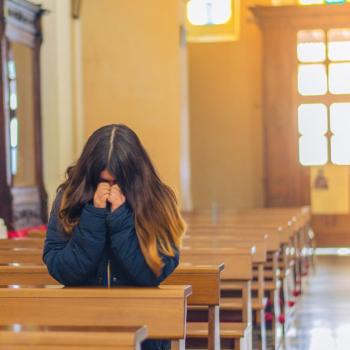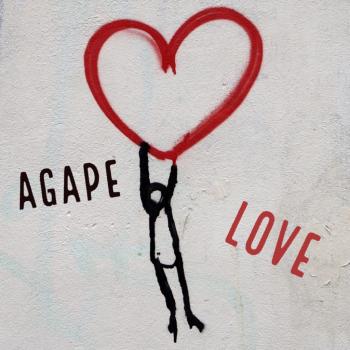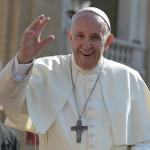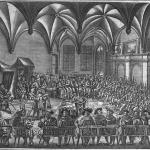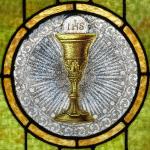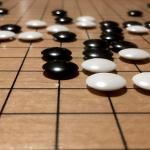In Dostoevsky’s masterpiece, The Brothers Karamazov, we find one of his most important character studies, that of Ivan Karamazov. Here we have a man who wants to prove to one and all that he is an intellectual, and he does this by putting himself in radical opposition to God. There is a sense of anger in his revolt. Humanity has suffered at the notion of God, and so it is suggested that only by the radical denial of God, only by embracing the nihilism of the present age, can humanity find itself free from a tyrant who has dominated its destiny throughout history. With God, there is no freedom – there is only a cold dictator who denies humanity its rightful place in the universe. God demands too much from us. God’s laws limit who we are and what we can do. On the other hand, without God, everything is lawful, everything is permissible. For without God, there is no moral force left in the universe to deny us anything we would want to do. Humanity must grow up and deny its childish adherence to God.
Dostoevsky understood the inherent contradiction behind Ivan’s rebellion – to rebel against God, one must believe in God. To fight against God on the basis that God must be a monster requires one to accept God and God’s moral order.[1] Ivan, who taught that anything is possible, taught it on the basis that human freedom was a good – but if it is a good, then there must some sort of moral meaning and order in the universe, the kind of which can only come from an absolute authority, that is, God. It took his half-brother, Smerdyakov, to show him this – his half-brother who, believing Ivan’s lies, took them to their proper conclusion, and killed their father to prove he could live life as if he were a free man. He expected this would get Ivan’s approval (and yet, the irony of course is that Smerdyakov had transferred the qualities of God to his brother, and this had him make his brother’s dictates as moral absolutes, proving that one can never get away from them). Ivan was disgusted when he learned what his half-brother had done. Ivan wasn’t the man-god that Smerdyakov had believed him to be; in the end, he was told by Smerdyakov that his writings had all been lies, and that he did not believe what he had written. No longer having any faith in his brother, Smerdyakov did the only thing he thought he could do: he killed himself (which in Dostoevsky serves as the ultimate revolt against God because it is an attack on existence itself!). He had to rebel to the end, even if to prove to himself that he could do it. Ivan, broken by the experience, at last came to see the devil within, the one which has been having him fight against God for so long. Indeed, the devil comes out and says it: Ivan made God arbitrary; confusing this with freedom, Ivan only pretended to want it. “There is no law for God. Where God stands, the place is holy. Where I stand will be at once the foremost place . . . ‘all things are lawful’ and that’s the end of it!”[2] In such freedom anything would be permissible. Murder is just as acceptable as charity. It was this devilish attitude which led Smerdyakov to kill his father, to show that he can do that which is required to prove oneself worthy of this new man-godhood. Ivan, from this, realized that if there is a devil which is capable of encouraging such evil, indeed, if there is evil, then something must not be permitted, and therefore, there must be a God. It was only after his father had been killed by his ideology that he was able to overcome it and see it for the delusion it had always been.[3]
Following Lacan, Žižek brings out his own protest to Dostoevsky’s position, one which at first might appear to contradict it, but in light of further analysis, actually serves as its authentic complement. He says that if God does not exist, everything ends up prohibited, while if God exists, then everything becomes permitted:
Everything is permitted to today’s hedonistic Last Man – you can enjoy everything, BUT deprived of its substance which makes it dangerous. This is why Lacan was right to turn around Dostoyevski’s well-known motto: “If God doesn’t exist, everything is prohibited!” God is dead, we live in a permissive universe, you should strive for pleasures and happiness — but, in order to have a life full of happiness and pleasures, you should avoid dangerous excesses, be fit, live a healthy life, not harass others… so everything is prohibited if it is not deprived of its substance, and you end up leading a totally regulated life. And the opposite also holds: if there is God, then everything is permitted — to those who claim to act directly on behalf of God, as the instruments of His will.[4]
“If God does not exist, everything is prohibited.” If everything is permitted, how can its complement be everything is prohibited? Žižek, while on the right track, gets off it too soon, and fails to see how his position can be complementary to that of Dostoevsky.[5] Once everything is permitted in this fashion, everything becomes meaningless, devoid of value and substance. Žižek agrees with this, and shows how, in the world around us, we everything we make is now filled with fakery; it’s not real. These fakes demonstrate the unreality which our nihilistic culture seeks. However, what lacks reality, insofar as it is unreal, it cannot be said to be, and so is nothing whatsoever. Everything being permitted here allows nothing to be permitted, because all there is ends up being unreal, nothing. Interestingly enough, in his second position, again in apparent contradiction with Dostoevsky, Žižek points out that if God exists, everything is permitted. This is because with God, reality itself exists, what is done is able to have a real, substantial value. But it is even more than this, for with the Christian, there is a true sense of freedom, which is what Žižek looking to Paul points out:
As Badiou emphasizes, here St Paul is unexpectedly close to his great detractor Nietzsche, whose problem was how to break away from the vicious cycle of self-mortifying morbid denial of Life: for him the Christian ‘way of the Spirit’ is precisely the magic break, the New Beginning that delivers us from this debilitating morbid deadlock and enables us to open ourselves to the Eternal Life of Love without Sin (i.e., Law and the guilt the Law induces). In other words, it is as if St Paul himself has answered Dostoyevsky’s infamous, ‘If there is no God, everything is permitted!’ in advance – for St Paul, precisely since there is the God of Love, everything is permitted to the Christian believer –that is to say, the Law which regulates and prohibits certain acts is suspended. For a Christian believer, the fact that he does not do certain things is based not on prohibitions (which then generate the transgressive desire to indulge precisely in these things), but in the positive, affirmative attitude of Love, which renders meaningless the accomplishment of acts which bear witness to the fact that I am not free, but still dominated by an external force: “‘All things are lawful for me,” but not all things are beneficial. “All things are lawful for me,” but I will not be dominated by anything’ (1 Cor 7:12 – ‘All things are lawful for me’ is often translated also as ‘Nothing is prohibited to me’!). [6]
For the law forms the basis by which we understand our place in the world; it establishes meaning and order, but in doing so, when left to its own devices, it traps us in a cycle of sin.[7] Grace perfects the law and fulfills it; indeed, the law, when properly understood, points to grace, for it shows us our need for it. Grace allows us to benefit from the law without being caught up by it. Indeed, one can say the law is the stage of human activity; we are either on top of it, free to move around, or we are trapped below, closed off from any activity in the world. On top of the stage, we have liberty, beneath the stage, we are as if in a prison (and the more we struggle in this pit, the further we move away from the ladder of grace which leads back to the top, and the more trapped we become).
Everything becomes possible when reality is affirmed, but, for anything to be possible, there needs to be order, there needs to be the law. This helps us to understand why the letter of the law kills, because the letter is the prison which prohibits movement when one is underneath it. We can then understand why the spiritual fulfillment of the law gives us life, because then the law can serve as the ground in which we walk and move. It is in this way Jesus came, not to remove the law (because its removal would also remove meaning and value in the world), but to fulfill it, to let it become what it was meant to be.[8] Without the law, there is no meaning, with the law left by itself, there is only death, but with the law fulfilled by grace, fulfilled by love, everything becomes new, everything becomes full of life, everything becomes realized – everything is, as Paul would say, permitted.[9]
It is for this reason why the conflict between legalists who follow the law without the spirit, and antinomians, who believe the law has been renounced in the order of grace, represents a false dichotomy – for the world to be, for our actions to have any real meaning, there must be a law which regulates and grace which frees. This, paradoxically, makes the fulfilled law the law of freedom.[10] The law fulfilled by grace permits everything, not in the sense that we are allowed to murder, but rather, we are able to actually do and achieve positive goods. Without it, then there is nothing left, but the empty nihilistic life, reproducing illusion with illusion, and that, however free it might appear, is the way which leads to hell. That we exist, that we naturally try to find order in the world, indicates we know that there is something which structures the universe, that there is a God. That we feel trapped by this law leads us to take one of two ways to address it: either we must try to deny reality itself, and take upon ourselves the way of nihilism, grasping for unreality, seeking the destruction of everything so that we can be free to not-exist, or we must look for the way of grace, to be set free from the pit of sin, so that through the law which we know exists, we can find freedom in existence, a freedom which can only be called abundant life. Hell or heaven, both are ways of grasping for freedom, but only heaven can bring joy and with it eternal rest, while the search for non-existence, there can only be misery, since, no matter how far we have followed its route, we will always realize, we still exist, and our desire has not been achieved.
Footnotes
[1] This is also why any assault against God from a humanistic foundation is ultimately doomed to failure. Their argument is inherently self-contradictory. It requires an acceptance of the Good (which is God) to deny God. Secular humanism seeks to find what is good from that which human nature can establish to be good. Yet, since humanity is in the image and likeness of God, what is discovered as good in humanism is ultimately what is found analogously in God – to accept humanity is to implicitly accept God, however explicit the denial might be.
[2] Fyodor Dostoevsky. The Brothers Karamazov. Trans. Constance Garnett (Chicago: Encyclopedia Britannica, Inc., 1952), 345. Of course the devil is presenting a false presentation as to what freedom is, because it is not arbitrariness – and this was the whole point.
[3] Dostoevsky could be said to have prophetically countered Freud’s punch, and showed it for the feint it actually was!
[4] Slavoj Žižek, “Passion In The Era of Decaffeinated Belief,” The Symptom. Volume 5. Winter 2004 <http://www.lacan.com/passionf.htm>.
[5] Ultimately, this is because Dostoevsky and Žižek are not discussing the same thing, even if the same words are being used. Žižek’s reflection requires an ontological interpretation, while Dostoevsky’s does not.
[6] Slavoj Žižek, The Ticklish Subject (New York: Verso, 2008), 174-5. Žižek however confuses this theme in many of his works when he tries to use it to suggest that this freedom ultimately becomes a freedom to do that which is evil (such as acts of terrorism); but evil, being founded upon unreality, cannot be what is accorded in this freedom.
[7] “Qui non dicitur littera occidens eo quod mala sit lex, sed quia prohibens peccatum, auget concupiscentiam et addit praeuaricationem, nisi liberet gratia; quae gratia non sic abundabat in lege ut in euangelio. It is not called the letter that kills because the Law is bad, but by forbidding sin, unless grace liberates, it adds to concupiscence and adds to sins, the grace of which was not as abundant in the Law as in the Gospel.” Peter Lombard, Sentences. Book III, dist XL, c2.
[8] “Think not that I have come to abolish the law and the prophets; I have come not to abolish them but to fulfil them. For truly, I say to you, till heaven and earth pass away, not an iota, not a dot, will pass from the law until all is accomplished. Whoever then relaxes one of the least of these commandments and teaches men so, shall be called least in the kingdom of heaven; but he who does them and teaches them shall be called great in the kingdom of heaven” (Matt 5:17-19).
[9] “”All things are lawful for me,” but not all things are helpful. “All things are lawful for me,” but I will not be enslaved by anything” (1Cor. 6:12). Žižek, or his editor, gives us the wrong chapter for this verse.
[10] Such as we find in the works of St Anthony of Padua: “The law of perfect freedom is the love of God which is perfect in every way and makes man free from all slavery,” St. Anthony of Padua, Sermones for the Easter Cycle. Ed. George Marcil, OFM (St. Bonaventure, NY: The Franciscan Institute of St Bonaventure University, 1994), 196-7.





